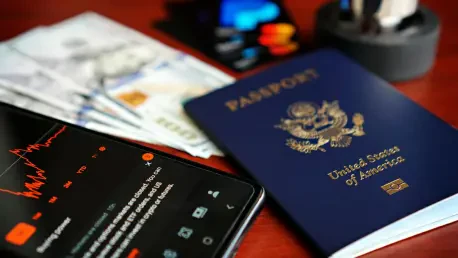In the dynamic landscape of 2025, North American travel trends reveal a complex picture of leisure travelers’ changing preferences and aspirations. An in-depth study featuring over 32,000 travelers from 32 countries provides significant insights into the evolving expectations of American and Canadian tourists. The research outlines the motivations, inclinations, and emerging trends impacting their travel choices. A marked shift towards optimism and relaxation dominates this narrative, signifying a crucial shift in priorities as travelers navigate these evolving patterns. Notably, despite economic uncertainties, a majority of North American travelers remain hopeful and eager to explore new destinations. This positivity largely stems from an intrinsic desire for relaxation, underpinned by the indulgence in serene beach retreats and an intimate connection with nature. Such endeavors consistently capture the essence of leisure travel, portraying tranquility as a fundamental theme this year. Meanwhile, travel expenditure patterns add another layer to this evolving story.
Travel Spending Patterns and Cultural Enthusiasm
An intriguing facet of 2025’s travel dynamics includes spending behavior, with a nuanced approach highlighting changing economic tendencies. Approximately 42% of North American travelers plan to increase their travel budgets during this period, driven by the rising costs associated with travel and a growing inclination to explore more distant locales and savor new experiences. Another 45% intend to keep their spending consistent, indicating a balanced approach to travel expenditure amid thin economic margins. Conversely, a smaller group, 12%, anticipates reducing their budget, influenced perhaps by a conscious alignment with minimalist trends. Dining experiences emerge as a pivotal indulgence, with around 64% of travelers expressing enthusiasm for engaging with local culinary fare. This culinary inclination aligns with a larger international sentiment where food acts as a significant determinant in choosing a destination. Such choices resonate with roughly 48% of global travelers, marking a universal trend toward culinary exploration that strongly influences travel decision-making.
The Ascension of AI in Travel Planning
Another element significantly reshaping the travel domain is technology, particularly Artificial Intelligence (AI), in planning itineraries. AI utilization has seen substantial escalation from the preceding year, marking a nearly 10% surge globally, reflecting travelers’ growing trust in technological solutions. In North America, AI finds a receptive audience, with 76% of American and 69% of Canadian travelers expressing confidence in AI’s ability to provide dependable travel information. This increasing dependency underscores its role as a trusted tool in crafting seamless travel experiences. Furthermore, a confident 79% of American tourists, alongside 70% of their Canadian counterparts, employ AI to support comprehensive trip planning, further cementing AI’s indispensable role in modern travel dynamics. Through AI, travelers embrace streamlined solutions offering enhanced convenience and satisfaction across various travel planning aspects, thus redefining the contours of leisure travel in the digital age.
Evolving Accommodation Preferences
Current accommodation choices also illustrate a paradigm interested in adaptability and customization. Hotels retain preference as the primary choice for about 62% of North American travelers seeking leisure stays this year. Key factors influencing such choices include affordability, geographic convenience, cleanliness, available amenities, and security considerations. Conversely, vacation homes present a compelling alternative, attracting travelers to private accommodations that offer longer duration stays combined with enhanced amenities and greater personal space. This shift signifies a growing demand for flexible lodging options catering to diverse preferences. Moreover, the enduring appeal of staying with friends or family remains apparent, with 28% of respondents opting for such arrangements. This trend highlights the role of social connections in shaping travel plans and reinforcing familial and societal bonds through shared travel experiences.
Dynamics and Diversity in Travel Companions
The dynamics of travel companions contribute another layer to traveler psychology in North America. Solo travelers often prioritize autonomy in planning, cherishing the freedom to explore destinations on their own terms, meet new people, and savor enriching experiences. This year, younger travelers dominate this cohort, reflecting new desires for solitary escapes focused on both introspection and exploration. For couples, minimal friction is common during travels. Nonetheless, issues can arise over destination choices, itineraries, and harmonizing differing interests. An interesting divergence appears among different age groups; older couples generally demonstrate smoother travel interactions than those among younger generations such as Generation Z. Family travel remains distinguished by motivations centered around relaxation and familial bonding, with a substantial 82% underscoring the importance of exposing children to diverse cultural narratives. These patterns illuminate how North American travelers engage in meaningful ways through their unique travel endeavors.
Broader Travel Themes and Future Considerations
In the fast-paced world of 2025, North American travel trends are unveiling a multifaceted view of changing preferences among leisure travelers. A comprehensive study, which examined over 32,000 travelers from diverse countries, offers valuable insights into the shifting expectations of American and Canadian tourists. The findings highlight motivations and emerging trends influencing travel choices. Optimism and relaxation are at the forefront of this narrative, reflecting a significant shift in priorities as travelers adapt to these trends. Despite economic challenges, many North American travelers remain hopeful and keen to discover new locales. This positive outlook is fueled by an inherent desire for relaxation, with serene beach getaways and a closer connection to nature playing pivotal roles. Such pursuits capture the spirit of leisure travel, showcasing tranquility as a key theme this year. Furthermore, spending habits of travelers provide additional depth to the evolving travel story, underscoring a noticeable trend in how individuals allocate their travel budget.









